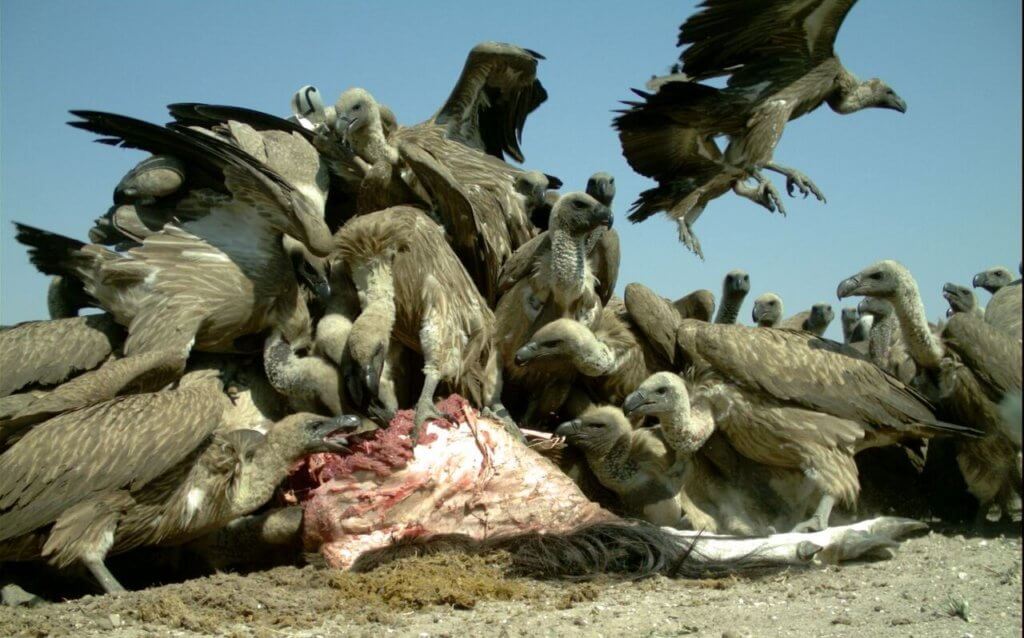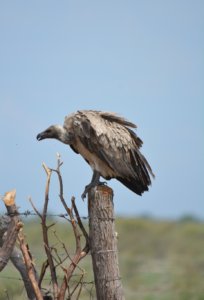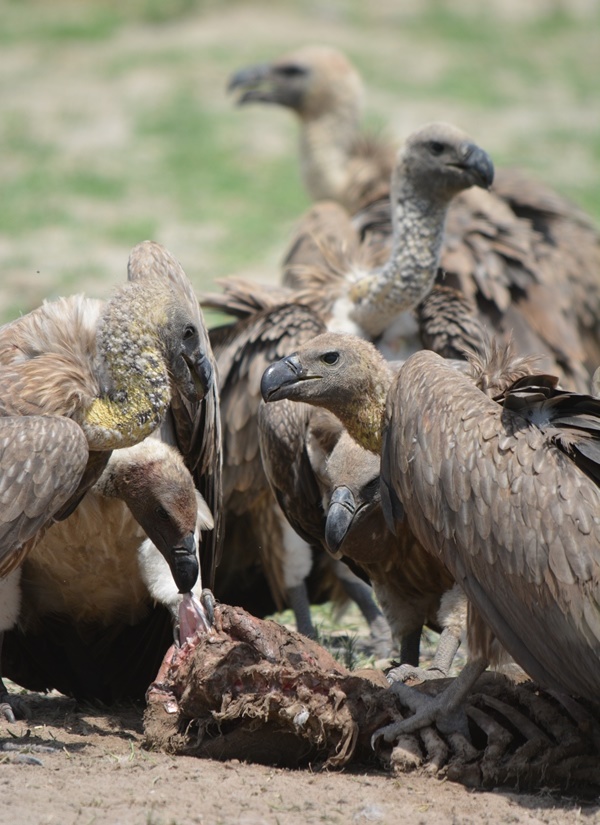
BIG GAME HUNTERS IN AFRICA URGED TO DROP THE LEAD TO HELP SAVE VULTURES!
Lead bullet fragments in carcasses left by hunters are poisoning endangered African vultures, a new study has found.
A third of all vultures caught and tested in the Botswana study showed elevated levels of lead in their blood, most likely due to ingesting lead bullet-contaminated flesh. Hunters’ bullets shatter inside their prey and can then be absorbed into the blood stream of the vultures when they feed on these animals or their remains. This ingested lead is highly toxic to birds.
‘We were all shocked by how widespread lead poisoning was for this population and just how clearly these elevated levels were associated with recreational hunting activity’, said Dr Arjun Amar, Associate Professor from the University of Cape Town’s FitzPatrick Institute of African Ornithology, who supervised the research.

The study, published this week in the international journal Science of the Total Environment, is based on tests of nearly 600 critically endangered African White-backed Vultures. Higher lead levels were found in the blood of vultures in the hunting season and in hunting areas, suggesting that the source of the lead in their blood stream was lead bullets used for hunting.
‘The only logical explanation for the patterns of lead poisoning we observed is if lead bullets were the source of this contamination‘ said the study’s lead author Beckie Garbett, who conducted the research as part of her PhD.
The four-year study was conducted jointly with Raptors Botswana, a conservation NGO. It has prompted a call for a national ban on lead bullets in the hope of minimising negative impacts on vulture populations, which are declining throughout Africa. Previous vulture studies linked declines in several species across the continent to mass poisoning, usually by farmers trying to kill other predators, or poachers deliberately trying to kill vultures for fear they might give away their location.
Researchers believe alternative non-lead ammunition, already adopted in some countries, could provide a helping hand to vultures. ‘Whilst lead poisoning may not be the main driver for the declines in vultures across Africa, it is something that can be tackled more easily through simple legislation, as compared to stopping the illegal actions of livestock owners or poachers’ Amar said.
Lead poisoning was one of the main reasons for the near extinction of the Californian Condor and is known to increase mortality and reduce breeding performance in birds. Thus, shattered fragments of bullets left in the carcasses of big game animals on the African savannahs could also be accelerating the decline of vultures.
The latest research also suggests that the 2014 ban on hunting on government owned land in Botswana has had no effect on the lead levels in vultures. Lead levels in vultures actually increased after the ban, and the researchers believe vultures may have shifted their foraging to private game farms where hunting is still allowed: ‘Hunting may have become more concentrated after the ban and this might explain the increase in lead levels in vultures following the ban, since the vultures may have tapped more into this food supply. We also need to consider that because vultures range so widely, they are exposed to lead use throughout the region, therefore mitigation of this issue needs to be addressed at a regional level’ Garbett said.
The authors of the study have called for greater awareness among policy makers of the threat that lead ammunition may pose to vultures. The Convention for Migratory Species (CMS) has also urged all signature countries to phase out the use of lead ammunition. Whilst Botswana is one of the few countries yet to sign the convention, the authors urge policymakers there to implement this call. ‘To do so is particularly important for species like vultures that range widely across international borders’ the study said.
ENDS

- The work was funded by Denver Zoological Foundation, Rufford Grant, Leslie Brown Memorial Fund, Wilderness Wildlife Trust, Mohammed bin Zayed, the National Research Foundation of South Africa and the DST-NRF Centre of Excellence grant to the FitzPatrick Institute of African Ornithology, University of Cape Town.
- The full reference for the paper is: Rebecca Garbett, Glyn Maude, Pete Hancock, David Kenny, Richard Reading& Arjun Amar. 2018. Association between hunting and elevated blood lead levels in the critically endangered African white-backed vulture Gyps africanus. Science of the Total Environment.
[registration_form]
Yes. And I hope nobody missed this:
independent.co.uk/news/health/lead-exposure-linked-412000-premature-deaths-heart-disease-us-the-lancet-study-a8252791.html
Indeed; the paper and associated summary article are worth reading and make some interesting points, including that these estimates of people affected by lead exposure are comparable to the annual number of deaths in the US in people who currently smoke:
“A key conclusion to be drawn from this analysis is that lead has a much greater effect on cardiovascular mortality than previously recognised. Lanphear and colleagues’ calculation that lead accounts for more than 400,000 deaths annually in the USA represents a tenfold increase over the number of deaths currently ascribed to lead.”
“The time has come to end inattention to the contribution of pollution to mortality from non-communicable diseases and to thoroughly re-examine lead’s role in changing global patterns of cardiovascular disease. The information that emerges from this reassessment will increase understanding of lead’s contribution to mortality from non-communicable diseases, could foster collaboration between the environmental and chronic disease research communities, guide realignment of cardiovascular disease prevention strategies, and ultimately save lives.”
Absolutely, MP – the original paper was linked to by Rob Sheldon on Mark’s Tweets yesterday, and it’s a really important study.
It’s from the well-respected NHANES health survey, and the 400,000 deaths attributable to low-level lead toxicity come from a total of about 2.3 million deaths from all causes in the US each year. So very low levels of lead are responsible for over 15% of all deaths, and the steepest increase in risk was found at the lower concentrations of lead.
Any shooter who tries to belittle the importance of low-level exposure to lead is simply off his head.
I haven’t read the paper, but find it quite incredible that there should be so many big game carcasses lying around for the residual lead fragments they contain to become such a serious issue. Are these the remains left by trophy hunters? Yet more problems resulting from man’s perverse pleasure-seeking at the expense of fellow sentient creatures!
It is possible that it is not just ‘big game hunting’ contributing to this but also shooting of animals such as jackals that are shot not for sport but because they are perceived as a pest by farmers and others.